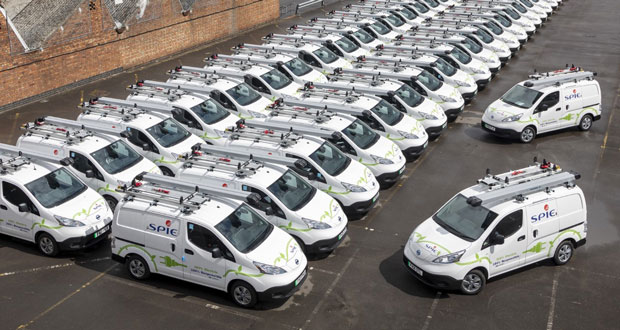SPIE UK has today revealed details of its future fleet strategy. The announcement comes in conjunction with the rollout of 60 new Nissan e-NV200 electric vehicles, the first in a series of rollouts of alternative fuel vehicles across the business under the new strategy.
Under its future fleet strategy, SPIE UK has set itself the target of replacing 98 per cent of its fleet with alternative fuel vehicles by 2025. The move is part of SPIE’s commitment across its business to reduce its impact on the environment, in line with its yearly Integrated Annual Report. With the adoption of alternative fuel vehicles across its fleet, SPIE UK has calculated that it should reduce its emissions by approximately 20 per cent in the next 12 months, and is estimating an 80 per cent reduction by 2025.
The first vehicles to hit the road under the future fleet strategy will be 60 Nissan e-NV200 vans. SPIE has chosen the e-NV200 because it aligned with its operational requirements. Alongside the zero tailpipe emissions, the e-NV200 also delivers low operating costs, high efficiency and high-end levels of performance. The award-winning vehicles are powered by the same 40kWh battery as the Nissan LEAF, providing an operational range of 187 miles together with a maximum cargo capacity of over 450kgs and four cubic metres plus vehicle-to-grid charging technology. Moreover, the vehicles will be fitted with a range of technology features to improve the safety, performance and ease of use of the vehicles. These features include autonomous braking, driver and passenger airbags, vehicle telemetry, 60 Mph speed limiter, front and rear facing safety camera technology plus parking assistance sensors and cameras. Additionally, to help drivers and reduce “range anxiety”, the vehicles feature satellite navigation with live traffic displays and directions to nearby charging points.
As part of the future fleet strategy, SPIE UK wanted to make sure that the rollout of the new electric vehicles would not make working life more difficult for their employees. As well as choosing the most appropriate vehicles, a mobility survey was launched to understand the specific needs of the workforce and how the vehicles would be used. With the vehicles being parked at employee’s homes, charging and renumerating employees for the associated costs was identified as a key issue. In line with this, SPIE UK has partnered with Shell Fleet Solutions and NewMotion – a member of the Shell Group – to install a complete home charging solution for users of the new vehicles. As part of the solution, the smart charge points will monitor the amount of electricity being used to charge the electric vehicles (EVs). SPIE employees will be reimbursed accordingly for the costs of the EV charging. This approach avoids the pay and reclaim model typically used for electric vehicle fleets, ensuring that SPIE employees will not have to bear the cost of operating the vehicles themselves at any point. Additionally, SPIE employees can also charge on-the-go with the Shell Card, providing access to almost 8,000 charge points across the UK. The Shell Card also enables the consolidation of home and on-the-go charging into one invoice, contributing to an easier transition to EV for SPIE.
Keith Atkins, Head of Fleet, SPIE UK commented: “The introduction of these electric vehicles is the latest step in the SPIE UK future fleet strategy and is another step that SPIE UK is taking in its transition to meet its climate goals. Throughout the process, we have ensured that not only will the rollout of alternative fuel vehicles work for our business but also our employees. Working with them to understand how we can make this change a sustainable part of their lives, as well as being a sustainable change for the planet, was incredibly important to us. We believe that the steps that we have put in place will ensure that SPIE UK will successfully play its part in a low carbon future, and we look forward to working with our partners to achieve this.”
In order to understand how FMs have navigated their way through the last year and their plans for meeting stringent waste and recycling targets we’ve posed a series of questions – aided by the advice and experience of our editorial steering committee.
The results of the 2021 survey will be published in FMJ magazine and form the basis of a white paper co-written by FMJ and the experts at Grundon on how to approach waste and recycling strategies.
To take part in the survey click here.





